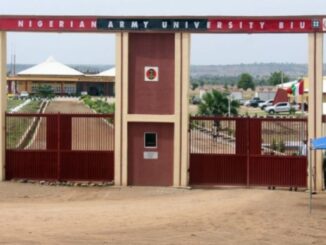
The state of education in Nigeria is generally seen as inadequate, with a low literacy rate, inadequate funding, and lack of access to quality education, particularly in rural areas. The education system faces challenges such as shortage of teachers, outdated curricula, insufficient educational resources, and inadequate infrastructure. However, there have been efforts by the government and private sector to improve the education system, including increasing funding, providing scholarships, and implementing programs to attract and retain teachers.
Efforts Made By the Government and Private Sector to Improve the Education System in Nigeria;
- Increased funding for education: Nigeria is aimed at addressing the persistent problems of inadequate resources, insufficient infrastructure, and shortage of qualified teachers. The Nigerian government has committed to allocating a larger portion of the national budget to education, with the goal of improving access to quality education and reducing the gap between urban and rural areas. Private sector organizations have also contributed to funding efforts, through partnerships with the government, non-profit organizations, and direct investments in educational initiatives. Increased funding is expected to lead to better resources, improved infrastructure, and increased opportunities for teacher training and professional development.
- Provision of scholarships for students in Nigeria: Provision of scholarships for students in Nigeria is aimed at increasing access to education, especially for underprivileged and marginalized communities. Scholarships can help cover the costs of tuition, books, and other educational expenses. The Nigerian government, private sector organizations, and non-profit organizations offer scholarships to students based on financial need, academic merit, and other criteria. These scholarships can help reduce the financial burden on families and encourage more students to pursue their education. Some popular scholarship programs in Nigeria include the Tertiary Education Trust Fund (TETFUND), the Nigerian Liquefied Natural Gas (NLNG) Scholarship, and the Central Bank of Nigeria (CBN) Education Trust Fund.Implementation of teacher training and professional development programs.
- Expansion of access to education, especially in rural areas in Nigeria: Expansion of access to education, especially in rural areas in Nigeria. Expanding access to education in rural areas in Nigeria is a major challenge, but also a priority, in efforts to improve the education system. This is because rural areas often have limited resources, inadequate infrastructure, and fewer educational opportunities compared to urban areas. To address this, the Nigerian government and private sector organizations have implemented various initiatives to increase access to education in rural areas, including:
- Providing educational materials and resources
- Recruiting and training teachers for rural areas
- Offering alternative education programs, such as vocational education and e-learning
- Encouraging parental involvement in education
- Offering scholarships and financial support to students from rural areas
- Partnering with non-profit organizations to support education in rural areas.
Note: These efforts are aimed at reducing the disparities in access to education between urban and rural areas, and ensuring that all children, regardless of their location, have access to quality education.
- Implementation of teacher training and professional development programs: Implementation of teacher training and professional development programs in Nigeria is an important aspect of improving the education system. The programs aim to equip teachers with the knowledge, skills, and resources necessary to provide quality education to students. These programs include:
- In-service training for teachers to update their knowledge and skills
- Workshops and seminars to enhance teaching methods
- Mentorship and coaching for new teachers
- Provision of educational resources and materials
- Implementation of performance-based evaluation and promotion systems
- Encouragement of continuous professional development through professional organizations and academic institutions
- Collaboration with international organizations to provide exposure and training opportunities for Nigerian teachers.
NOTE: By providing training and professional development opportunities, teachers can improve their teaching skills and become more effective in the classroom, which in turn leads to improved learning outcomes for students.
- Investment in infrastructure, such as building schools and providing educational materials; Investment in infrastructure and educational materials is crucial for improving the education system in Nigeria. Building schools and providing educational materials helps to increase access to education, especially in rural areas. Some of the initiatives aimed at improving infrastructure and providing educational materials in Nigeria include:
- Construction of new schools, especially in rural areas
- Renovation and rehabilitation of existing schools
- Provision of basic educational facilities, such as classrooms, libraries, and laboratories
- Investment in technology, such as computers, internet access, and multimedia tools
- Provision of educational materials, such as textbooks, teaching aids, and stationery
- Partnership with private sector organizations to provide resources and support for education
- Encouragement of community involvement in the development and maintenance of educational infrastructure
- Allocation of funds from the national budget and other sources to support education infrastructure development.
Investment in infrastructure and educational materials can improve the quality of education and provide students with the resources they need to learn effectively. This in turn can help to increase enrollment and reduce the dropout rate.
- Introduction of alternative education programs, such as vocational education and e-learning
- Partnership with private sector organizations to provide resources and support for education
- Implementation of policies to improve the quality of education, such as the National Policy on Education
- Encouragement of parental involvement in education
- Development of new curricula and syllabi that are relevant and up-to-date.


Leave a Reply